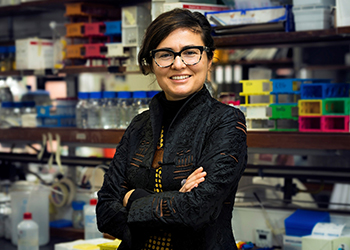HHMI, Bill & Melinda Gates, Wellcome Trust and Gulbenkian select 41 International Research Scholars

The Howard Hughes Medical Institute (HHMI), the Bill & Melinda Gates Foundation, the Wellcome Trust and the Calouste Gulbenkian Foundation announced the selection of 41 exceptional early-career scientists as International Research Scholars. Each researcher will receive $650,000 over five years, including Ana Domingos, group leader of the Obesity laboratory at the Instituto Gulbenkian de Ciência (IGC).
In 2016, these four Philanthropies have teamed up to develop scientific talent around the world in the biomedical research field. Nearly $26.7 million were made available to support early-career scientists with creative research programmes of outstanding quality. More than 1400 scientists across the globe applied to this programme, but only 41 researchers from 16 countries were selected. The selection process was conducted by a panel of distinguished international scientists that evaluated the impact of past work and the potential of the proposed research plan. Each foundation chose which scientists would like to support from that shortlist.
“This is an outstanding group of scientists who will push biomedical research forward worldwide, and we are thrilled to support them alongside our philanthropic partners,” said David Clapham, HHMI’s Vice President and Chief Scientific Officer.
Ana Domingos, IGC scientist, is one of the selected as HHMI-Wellcome International Research Scholar. Recently, Ana Domingos discovered a direct link between fat tissue and neurons of the sympathetic nervous system, which plays a role in burning fat. Stimulating these neurons could one day lead to a new treatment to cause fat loss. This funding will allow her to keep on investigating new molecular strategies to fight obesity. “It is a true privilege and an honor to be awarded by these Foundations”, says Ana Domingos. This is not the first time that international organizations award the IGC scientist, who has been recipient of the Human Frontiers Science Programme and the European Molecular Biology Organization (EMBO).
In Portugal, two other researchers were selected as International Research Scholars: Joe Paton, from the Champalimaud Foundation, and Catarina Homem, from CEDOC – Chronic Diseases Research Centre.
Jonathan Howard, IGC Director, says: “It is extraordinary how scientists in Portugal perform so well in highly competitive international calls, as this programme was. Three out of forty-one International Research Scholars is an excellent number. This is another indicator of how Portugal has scientists doing research at the highest international level.”
Chilean scientist Carlos Blondel, from Universidad Autonoma do Chile, was the Gulbenkian Foundation choice as HHMI-Gulbenkian International Research Scholar. Carlos Blondel is investigating interactions between microorganisms and humans, and its impact in the emergence of infectious disease by studying pathogens’ molecular weaponry.
The final count of International Research Scholars awarded to each country shows 7 for China, 6 for Australia and Israel, 3 for Chile, Portugal, Singapore and Switzerland, 2 for Spain, and 1 for Austria, Cambodia, Hungary, India, South Korea, The Netherlands, South Africa and Tanzania. This programme is open to scientists across the globe with the exception of G7 countries.
